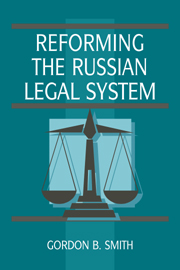Book contents
- Frontmatter
- Contents
- Preface
- 1 Pre-revolutionary Russian law
- 2 The Bolshevik experience
- 3 The history of legal reform
- 4 Forging a new constitution
- 5 Citizens and the state: the debate over the Procuracy
- 6 In search of a just system: the courts and judicial reform
- 7 Law and the transition to a market economy
- 8 Legal reform in the republics
- 9 Legal reform and the transition to democracy in Russia
- Appendix: Constitution of the Russian Federation
- Notes
- Index
1 - Pre-revolutionary Russian law
Published online by Cambridge University Press: 09 October 2009
- Frontmatter
- Contents
- Preface
- 1 Pre-revolutionary Russian law
- 2 The Bolshevik experience
- 3 The history of legal reform
- 4 Forging a new constitution
- 5 Citizens and the state: the debate over the Procuracy
- 6 In search of a just system: the courts and judicial reform
- 7 Law and the transition to a market economy
- 8 Legal reform in the republics
- 9 Legal reform and the transition to democracy in Russia
- Appendix: Constitution of the Russian Federation
- Notes
- Index
Summary
The trouble with us Russians is that the Tartar is so close behind us. We are a semi-barbarous people still. We put Parisian kid gloves on our hands instead of washing them. At one moment we bow and utter polite phrases, and then go home and flog our servants.
Ivan S. Turgenev (1818–1883)During his travels to London in 1698 Peter the Great encountered some English barristers wearing their wigs and gowns. “Who are those men?” Peter inquired of his escort. “Lawyers,” was the reply. “Lawyers!” exclaimed Peter, “What is the use of so many? I have only two in my whole empire, and I mean to hang one of them as soon as I return.”
The law and lawyers have not traditionally been accorded much power or status in Russia. Yet, like Peter, a current generation of Russian leaders wishes to reform and modernize Russian society and, in so doing, is eagerly adopting Western practices, concepts, and mores. At the heart of these reforms is the need to create a society based on the rule of law (Rechtsstaat). However, in order to establish such a legal system, Russia must overcome not only three-quarters of a century of communist rule, but also several hundred years of legal backwardness under the tsars.
- Type
- Chapter
- Information
- Reforming the Russian Legal System , pp. 1 - 26Publisher: Cambridge University PressPrint publication year: 1996

